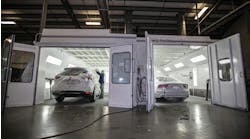Succession planning may not be on the minds of many shop owners, but these tips and perspectives will keep your exit plans moving in the right direction
In addition to getting the business's finances in order, collision shop owners have to ask themselves lots of difficult questions: Should I sell the business to a trusted manager? To a competitor? Pass it on to my children? If so, who's in the best position to inherit the responsibilities and obligations of the shop — the son or daughter who's been involved with the business for years, or all my children equally, regardless of their professional backgrounds?
Handing over your business to the next set of owners is a complicated process that has the potential to upset family dynamics and derail a profitable business. Transitioning out of the body shop you've built from the ground up — or watched grow from a fledgling operation into a profitable, thriving business — involves both financial and emotional decisions. But a combination of careful planning, expert advice and a measure of sensitivity can help set the business on the road to continued success — with minimal family drama along the way.
Experts: 'Think ahead!'
"When it comes to succession, it's much more than just a legal document," says family business advisor Mike Henning of Effingham, Ill. "Succession means passing along the assets, passing along the stock of the operation, passing along the power, the control, passing the values, the culture of the business, passing along the people that are involved and the individuals and the family — that's succession or generational transition."Henning, who runs a private consulting firm (the Henning Family Business Center) and teaches courses on succession planning for the Automotive Management Institute (AMI), tells his clients to start thinking about succession six to 10 years before they plan to retire. "They need to be thinking in advance and ahead of time, and sometimes it's tough getting people to do that," he says. "If they do [think ahead], they generally have more flexibility and less expense, which is the biggest thing."
But shop owners often fail to put a succession plan in place, and Henning thinks this is because of the emotional aspects of the process. "So many business people today, all they see when they talk about succession is documents, CPAs, documents, tax man — they think that's all it's about," he says. "The people I work with in that business think their portion is about 4 percent."
To deal with the emotional aspects of the business, Henning advises his clients to carefully consider all potential owners — both children and business partners. Often the business partner can't tolerate the risk of owning the business outright or he would already be in business for himself. Other times the partner just doesn't have the money or couldn't secure a loan for the value of the business. In these situations, Henning says, "sometimes the best bet is to sell it to a competitor who has money."
When collision repair shop owners decide to transfer the business to their children, Henning cautions them not to overlook children who aren't in the automotive profession. The ones who aren't active in the business could be involved peripherally — in a rental property or side business, for example. "Or you may find out a kid with no interest in the business suddenly has an interest," he says. "Just because they went off to be a teacher or dentist doesn't mean they don't have a sincere interest in the business. Many of the younger generation say they weren't asked to be involved and feel left out."
After determining a clear business plan, Henning advises shop owners to meet with an accountant and attorney to put in place plans for organizational and leadership development. Then, he insists, set a timeframe for the family member to prove he or she is capable of taking over and figure out the best way to start transferring responsibilities and assets.
Often this final step proves to be the hardest. "The senior generation really overlooks the emotional part of stepping back from the business, and many can't do it," Henning says. "They absolutely can't do it. They hang on to the business. They hang onto the control, and, of course, that frustrates the hell out of the next generation. They leave or become mediocre to poor employees."
One owner's plan: 'Divide the business'
Chuck Sulkala, 63, owner of Acme Body and Paint in Jamaica Plains, Mass., compares handing over his business to teaching a child how to ride a bike. "Sooner or later you have to let go," he says. "That's the time when your heart is in your mouth because what if they fall, what if they hurt themselves? Someday, whether you're there or not there, you have to let go. That's the hard part for someone who's owned a business. But I want to see them succeed and be successful."
More than 20 years ago, Sulkala took over his own father's collision repair shop. He bought out his father's partner and then spent the next 10 years paying back his father. "It was a pretty simple negotiation and deal, but I have a more convoluted situation going on," says Sulkala.
That situation involves four children from a first marriage and two from the second, only two of whom work in the automotive business. "That's become a real critical part in the evolution of thinking of how I transfer the business," he says. "I have to be fair not only to my son, who's working in the business, but to my other kids as well so they think they're getting a fair shake in the deal."
So Sulkala decided the best thing for the business — and the family — would be to split Acme Body and Paint into two components: the property and the automotive business. His son Chad Sulkala and long-time shop manager Mike Johnson will take over the business. "I had somewhat made a promise to, or offer to, Chad and Mike that it would be theirs," he said. "The problem with single ownership is that you can never leave. I thought the best thing for them would be to work as partners — that way someone's always watching the shop when the other isn't there."
That leaves the other children to inherit the property, which is valued at about $1 million. "What we've had to do is kind of step back a bit and take a look at the tax consequences and see not only how it affects the business but how it affects me as a corporation," Sulkala explains. Several months ago his accountant and attorney helped him formulate a property valuation and tentative succession plan for transitioning out of the business. It's a delicate balance — the property must be valued fairly so the IRS doesn't see it as a sweetheart deal, but Sulkala also wants to position the business for continued success. "It's an ongoing saga," he admits.
The goal for the near future is for Sulkala, as majority stockholder, to transfer his shares to Johnson and his son, but keep the building in his name. "I need to make the rent factor at least very reasonable so they can be successful," he adds. "If I don't make it so they can succeed, I've done nothing but guarantee that this deal will fail." Then not only will the business that's been in his family for two generations fail — he'll be minus his steady revenue stream. So he set the rent at a variable rate of 5 percent of sales, guaranteeing that the rental costs won't get in the way of the new owners' success and also leaving open the option of increasing his own monthly income.
Sulkala's retirement plan may be more complicated than some, but it underscores the fact that every business succession plan involves multiple considerations. "Far more than the tax man, far more than the dollars you receive, it's emotional," he says. "If it's not done patiently and with love, you end up hurting someone irreparably and that would be a very sad thing."
Another perspective: 'Reward loyal employees'
Dave Dunn, 51, owner of Dave's Auto Body in Galesburg, Ill., has a unique perspective on succession planning. As the managing director of the collision repair consulting and training firm Masters School of Autobody Management, he's advised clients in establishing business succession plans. But as a shop owner, he's experiencing the transition firsthand as he prepares to exit his auto body business and turn his attention to the consulting practice full time.
Dunn says his shop has "a bit of a strange deal" because he's transferring ownership not only to his son, Rob Dunn, but also to many of his long-time employees. "I never felt like it's right to make my kid in charge," he says. "I see a lot of companies the second generation screws it up because all the loyalties the first generation built get trampled on because they just give it to the kid because they're related to him."
So for the past several years Dunn has been gradually transferring assets to employees who have been with the shop for 15 years or more. "There's a built-in incentive factor for employees so they're really part owners," he says. "That can be part of a succession plan, especially for people my age who are 50 or greater who don't really want to be tied to the business every day. I want to give an incentive to my employees to feel that their ideas do matter and they do have a stake in the business beyond their paycheck."
The ownership transfer will take place over a 10-year period, so by the time Rob is 60 he'll be vested in ownership — though Dunn plans to retain control of the business through an operating agreement. "Who knows what the plan will be in 10 years, but I know that's the plan now," he says. "We get a tremendous amount of buy-in and loyalty from employees who see I haven't just put [Rob] in charge because he's of age."
Dunn also cautions other body shop owners not to overlook operational integrity in favor of financial considerations. "Often people fail to develop good operational integrity absent from a key decision maker," he says. Once you take that decision maker out of the loop, the operation struggles — or even fails. The goal then, Dunn says, is to transfer the core operating principles to other people so they can keep the business on track. "To be fair to people, they don't know what's in your mind," he says. "[Our company is] helping people to teach people how to think like them — or at least understand how they think."
Otherwise, he says, "what you're hand-ing to someone is a depreciating asset."



